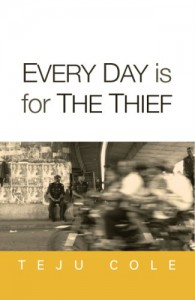2
Followers
24
Following
Mommy, am I cult?
A former literary snob making her way back to commercial reads.
Every Day is for the Thief
 1. This is not exactly fiction.
1. This is not exactly fiction.2. It's all about Nigeria.
3. It has a few over 100 pages. You can read it in a day, but I wouldn't recommend. This baby needs to be flavored, not just churned.
Religion, corruption, happiness. Why, if so religious, so little concern for the ethical life or human rights? Why, if so happy, such weariness and stifled suffering?
In my college days, I took Ethics lessons. The professor, a very interesting little man with an international PhD, told us about what was wrong with Brazil. Or why Brazil is so bad. This is a very common question, and every teacher, liberal worker, journalist or pretense intellectual in Brazil has an answer. It was the Portuguese, they said. Or the Catholic church. It is the elite. Capitalism. Socialism. All of those answers reeked of whatever political indoctrination disguised as knowledge they were fed at college. Or by the media. Every single one of them.
So I awaited with eagerness: what does this middle-class law professor with an international PhD could add? He introduced us to Hannah Arendt, and the notion that corruption exists in Brazil because Brazilians have little grasp on what “public” means. Or its differentiation from “private”. In the typical Brazilian mind, a public thing is not something that belongs to all, and to be cherished as it should be used by others, but a public thing is something that is yours for the taking. For you, your family, and friends. And the others could damn themselves. Hence corruption, nepotism, and “social skills” being more important, by a long shot, than merit and personal accomplishments.
I don’t know what Arendt (or my cute professor) would think of Nigeria.
But corruption, in the form of piracy or of graft, also means that most people remain on the margins. The systems that could lift the majority out of poverty are undercut at every turn. Precisely because everyone takes a shortcut, nothing works and, for this reason, the only way to get anything done is to take another shortcut. The advantage in these situations goes to the highest bidders, those individuals most willing to pay money or to test the limits of the law.
Although this is an analysis of the Nigerian culture, and a human recollection of why Nigerians are the way they are, it’s also an empathetic read to anyone living in a country riddled with corruption... like Brazil. Brazilians are stereotypically perceived as happy and celebrative, but it’s only a disguise for the extreme harsh life the usual Brazilian is stuck with. Low wages. Urban violence. The sense of being hostages to criminals. Crowds murdering criminals. The corrupt police. The corrupt public officers. Everything is there in the book, like it was written about us. We accompany a Nigerian coming back to his country after decades living abroad, and many of the situations he put himself there, I found myself in here, too.
But there is more to it than just corruption. Teju is not a proverbial anthropologist, wandering through the community with a finger resting on his chin and the detachment of a scholar. He mixes himself with Nigerian life. He suffers. He seeks comfort in art. And he gives us observational bites of a travel, pieces of story, as we were with him.
I won’t go into details here, as to not spoil it, but don’t expect a work of fiction. Not a dry non-fiction. Everyday is for thief falls happily in between, and the result is lean, smooth, honest and very interesting.
Hey, the photos are pretty nice too.





